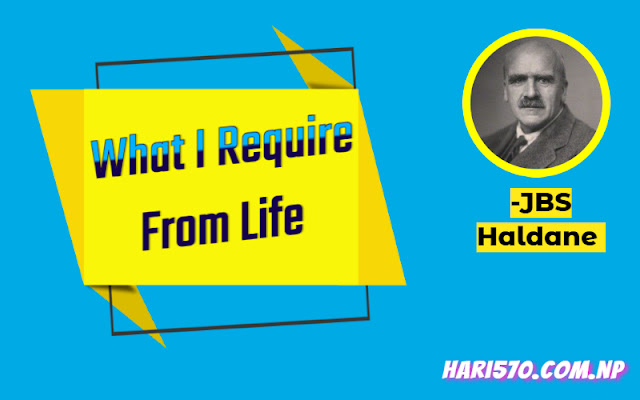Summary of the Essay: What I Require From Life by JBS Haldane Class 11 English
JBS Haldane, a British-Indian Scientist, wrote this personal essay titled “What I Require From Life.” This essay was first published in 1940 in the newspaper “The Daily Worker.” This essay has included a variety of political and philosophical viewpoints on the necessities of people’s lives.
It has primarily focused on socialistic convictions demanding democratic workplace activities. This essay has discussed the various needs of working-class people who are living their lives in various circumstances while trying to make ends meet. In this essay, the writer has used very simple and clear language in his writing style to discuss his needs and life experiences. His needs in life are similar to those of the majority of the world’s working-class people.
The author begins with his thoughts on his acceptance of the concept of the world as it is. He believes that he should not require the impossible in his life. He claims that imagining perfect beings in a perfect world will cause him to do more harm than good to others.
He was born in a peaceful era, according to the author. During his youth, he desired to live a peaceful life, but due to the outbreak of devastating World War I in 1914, he became involved in his heroic age. The devastation of World War I altered his outlook on peaceful living. In that critical situation in which he found himself, he desired to make the most of his time by attending to his basic needs such as food, water, clothing, and shelter.
The writer has discussed four general human needs that are quite important in this essay. These four general needs, which the writer and others require, are freedom, health, work, and friendship.
Freedom: The writer needs to be able to work freely. Everyone requires freedom. The writer values freedom of expression the most. He wishes to say and write about various poisonous aspects, but the law of libel forbids him.
Health: In order to work in his life, the writer must be in good health. People who are in good health are able to obtain all of the necessities in life. Good health brings happiness and success in life.
Work: The writer needs work with a decent salary, which is essential for everyone. He considers himself fortunate to have been able to choose his desired work to a large extent. He claims that, aside from his scientific work, he could easily be a war correspondent, write children’s stories, or deliver political speeches.
Friendship: The writer then requires the friendship of his coworkers and comrades. He prefers equality in society, where criticism can be freely expressed. His friendship must be free of the concept of obeying and ordering without question. Friendship should be formed with people of equal standing.
Aside from these basic needs, the writer has a number of desires in his life. He craves adventure in his life, even if it comes with risk.
According to him, the satisfaction of adventure is far more substantial than a thrill. He wishes to have his own room with books, a car, a daily bath, and easy access to a beach or a river. He wishes for all of these things but does not make demands for them. The writer considers himself fortunate to be able to enjoy his basic needs, but his pleasures are rendered ineffective if his friends do not find happiness in these necessities.
He wants to see healthy people working on the planet. All workers at work must find fruits that are appropriate for their abilities. They should work hard for their own profits as well as the well-being of their friends, but not for the profits of others.
The author wishes to see workers in control of their working conditions. As a socialist, he wishes to see a situation in which workers play critical roles and control the industry. He wishes to see the end of class and sex subjection. In order to achieve fraternity, people must be treated equally. There should be an economic revolution to end class and sexual oppression.
The writer would rather die happy than see capitalism is overthrown and workers take control of most of Europe. He wishes to see the end of fascism, which caused the First World War and the breakdown of the peace.
The author wishes to see education and scientific methods used in all aspects of life spread. Finally, he wishes to die if he can fulfil only two of Aristotle’s death conditions.

Effectively
Undetailed summery
Please suggest us what we can do to make it more detail… Suggestions are highly appreciated! You can also mail us on [email protected]
Regards,
Himal
Good writing. Thank you sir.
what are the last two aristotle’s condition sir?